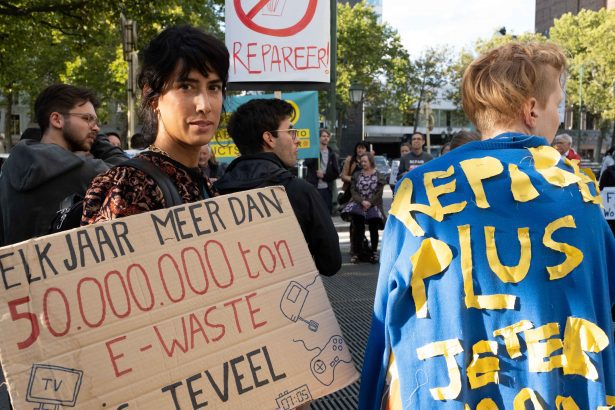Delft University of Technology
Within the Faculty of Industrial Design at TU Delft, the Department of Design for Sustainability deals with sustainable product development and design within the circular economy.
View profile

Consumer goods,
Designers, students, teachers
That we are going to (have) more repairs on the way to a circular economy is obvious. But what will we repair, who will do it and where? This article provides direction for how education can meet the growing need for craftsmanship as the economy soon transforms from linear to circular.
Leiden-Delft-Erasmus Universities
By: Merel Engelsman
Despite all kinds of changes in technology, logistics, information technology and awareness around the environment, the linear business model is still far dominant. 'Now that we want to move away from Sell more, sell faster and want a circular economy, we need to set up a whole repair infrastructure,' says Den Hollander. 'With a corresponding demand for skilled labor.'
Education must respond accordingly, even though it is difficult to predict how the circular economy will evolve. But whereas business models, product design strategies and consumer awareness need to undergo a major turnaround, Den Hollander believes that education is more about a shift in emphasis. 'Circular is a way of looking, a way of thinking, on top of the subject-specific knowledge and skills you already need. And the great thing is: once you have those circular glasses on, you can never take them off again.'
Since 2015, the government-supported CIRCO program, among others, has been running to engage entrepreneurs and creative professionals in the circular economy. In particular, video material covers all circular strategies, including repair. 'That video material is very suitable for education,' says Den Hollander. 'Together with a need from education, CIRCO's Teach the Teacher track grew out of that. Dozens of teachers from Hogeschool Rotterdam and other higher education institutions have already followed that voluntary track.'
Den Hollander has attended many teaching days. 'As soon as you explain that there are many more strategies than just recycling, you see the circular light go on in them. They immediately see where in their curriculum they could do something with it. You can also offer the CIRCO program in this way at secondary schools, but I don't know if that is already happening.' As far as he is concerned, the implementation of circular insights in vocational education is best left to the teachers themselves. 'Nobody knows their field better than themselves.'
That we are going to (have) more repairs on the way to a circular economy is obvious. But what are we going to repair, who is going to do it and where? In other words, what craftsmanship will we as a society (soon) need? According to Den Hollander, there is little scientific evidence to support this at the moment. But he does want to offer some thoughts.
Besides the type of product, the craftsmanship required for a repair depends on how it was designed. 'You have repair and repair,' says Den Hollander. 'Some repairs a consumer can do themselves. But if it gets too complicated or too dangerous, you need a novice craftsman or perhaps an expert.' Modular design (where, for example, any dangerous parts are packed into an easily replaceable module) can shift this balance somewhat. 'But even then, the real repair - by the expert - only begins once that module is taken apart and measured through, and returned to working condition.' So depending on knowledge and experience, someone will be assigned to a different place in the repair chain.
"Once you explain that there is much more to recycling than recycling, you see the circular light come on."
For effective design for repair and other circular strategies, Den Hollander prefers to see close coordination between different levels of education. 'Greatly oversimplified, it comes down to what someone with a university education comes up with as a principle is calculated and translated into a practical usable solution by someone from college,' he says. 'Finally, someone from the mbo has to be able to realize it competently. I once got back a prototype that had not been milled exactly according to the drawing, but that turned out to be the only way it worked. We must take this practical knowledge and skill with us to achieve maximum product life extension. As the Rotterdam University of Applied Sciences, we are therefore looking to collaborate with both intermediate vocational schools and universities.'
With circularity in vocational education being primarily a change of emphasis in existing (vocational) training programs, there does not seem to be a need for specific repair courses for the time being. 'Upcoming batches of graduates may well decide to do something with repair,' says Den Hollander. 'It has great added value and is also highly appreciated, I hear from people in repair cafes, among others. Something doesn't work, the person is fed up and you can change that. It makes people happy, also because of sustainability. Being a repairman is really a profession with professional pride.
Marcel den Hollander studied Industrial Design at TU Delft and is a commercial sustainability designer. In 2018, he received his PhD in Circular Product Design. His research Products that last is the basis for the program CIRCO. Since 2021, he has been a lecturer in Circular Manufacturing Industry at Hogeschool Rotterdam.
This is an article from the new white paper "Repair in the Circular Economy" by Leiden-Delft-Erasmus Universities. The white paper will also be available for download as a PDF at www.centre-for-sustainability.nl starting Nov. 13 . All articles, the executive summary and policy recommendations will also appear in English at www.leiden-delft-erasmus.nl. Can't wait? You can request the white paper in advance via this link.
Within the Faculty of Industrial Design at TU Delft, the Department of Design for Sustainability deals with sustainable product development and design within the circular economy.
View profile